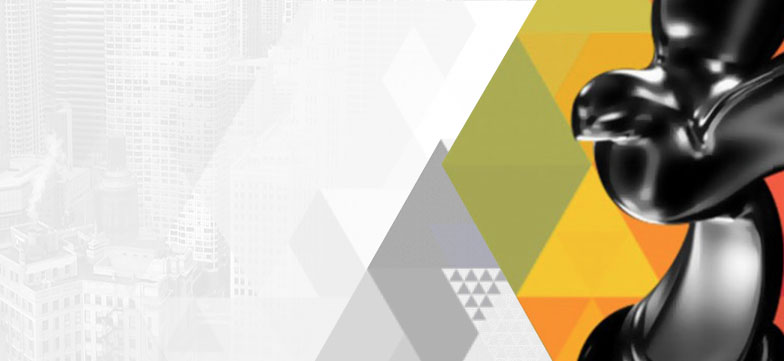EVENT HIGHLIGHTS
Niagara Foundation publicly recognizes individuals and organizations who have distinguished themselves in their profession and contributed their time, energy, leadership, and dedication to the cause of dialog, peace, understanding, education and community service.
Each year, Niagara Foundation recognizes individuals and organizations in the Midwest community who have demonstrated strong commitment to serving their community while maintaining a global mindset.
Date
Thursday, October 2, 2014
6:30 – 9:00 PM
Dinner & Awards Ceremony
Venue
Sheraton Detroit Novi Hotel
Ballroom A, B
21111 Haggerty Rd, Novi, MI 48375
6:30 – Reception
7:00 – Dinner
8:00 – Welcome & Opening Remarks
8:15 – Awards Presentations
EDUCATION AWARD
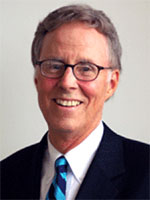
Michael P. Flanagan
State Superintendent, Michigan Department of Education
[lightbox id="michael-bio" width="800px" padding="30px"]
Michael P. Flanagan
A stalwart of education leadership and reform in Michigan, Mike Flanagan pushes local, state, and federal policy to ReImagine instruction for all students. Mike has directed the Michigan Department of Education since May 2005 and chairs the State Board of Education. With 30 years of leadership as a local, regional, and state superintendent, Mike brings decisive and practical vision to re-building a system that develops stronger educators and higher-achieving students.
As State Superintendent, Mike advises the State Board of Education, the Governor, and the state Legislature regarding public education in Michigan. He also has served as the Executive Director of the statewide associations that represent Michigan public school superintendents and intermediate school districts in the state.
For seven years, Mike Flanagan served as the Superintendent of the Wayne Regional Educational Service Agency (RESA). Prior to that, he was Superintendent of the Farmington/Farmington Hills School District in Michigan for five years. He is past chairperson of the Education Alliance of Michigan, a nonprofit coalition of leading parent, business, and education associations; and past president of the National County Superintendents Association.
Superintendent Flanagan has degrees from the University of Notre Dame and Eastern Michigan University. He is married to Anna and has three married children: Mike, Brian, and Christa and grandchildren: Alysha, Ella, Avery, Will, and Landen.
[/lightbox]
PEACE AWARD
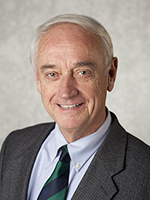
Douglas Kindschi
Director, Kaufman Interfaith Institute at Grand Valley State University
[lightbox id="douglas-bio" width="800px" padding="30px"]
Douglas Kindschi
Dr. Douglas Kindschi, now in his 39th of dean for 28 of those years. He is currently University Professor of Mathematics and Philosophy and the Director of the Kaufman Interfaith Institute. While Dean of Science he was responsible for 14 departments including the basic sciences, mathematics, computer science, the School of Engineering, the School of Health Professions and the Water Resources Research Institute. These departments included over 300 faculty and staff, and were responsible for over 35% of the course offerings to the university’s 23,000 students.
Douglas Kindschi received his bachelor’s degree in mathematics from Houghton College in New York, did graduate study at the Divinity School, University of Chicago. He received his M.A. and Ph.D. degrees in mathematics from the University of Wisconsin-Madison. His major interest in mathematics was in abstract algebra and he also completed a minor in philosophy as a part of graduate study. Kindschi’s interest in science and religion goes back to his time in graduate school at Wisconsin where he coordinated a faculty and student discussion group on the topic for two years that was sponsored by Lutheran Campus Ministry. At Grand Valley State University he began a faculty science and religion discussion group that is now in its 13th “Science, Mathematics and Religion: Ways of Knowing” which received a Templeton Course Award. He also received a Metanexus grant to establish the Local Society Initiative called the Grand Dialogue in Science and Religion for the Greater Grand Rapids Area.
While a graduate student at the University of Chicago Divinity School he first encountered the interfaith dialogue. In January, 2010, he was appointed as the founding director of the Kaufman Interfaith Institute. From January to July, 2013, he was a visiting fellow at the Cambridge Inter-Faith Programme at Cambridge University in England. He has been active for many years in the community and has served on the boards of the Grand Rapids Medical Education and Research Center, Porter Hills Retirement Communities and Services, Mary Free Bed Rehabilitation Hospital, the Van Andel Education Institute Council and the Advisory Board for the DeVos Medical Ethics Colloquy. He was the founding chair of the Pierce Cedar Creek Institute Advisory Board and a founding member and chair of the Science Support Advisory Board for the Raytheon Polar Services Corporation program in the Antarctica. Kindschi is also a member of the Board of Trustees for the McCormick Theological Seminary in Chicago. On the personal side, he has been married to his wife, Barbara, for 52 years and they have 4 children and 6 grand- children. Together they enjoy cross-country skiing, reading, walking the Lake Michigan beach and travel (especially since four of the grandchildren live with their oldest daughter and son-in-law in Germany.)
[/lightbox]
MEDIA AWARD
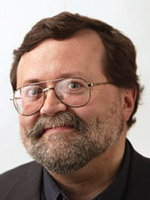
David Crumm
Founder and Director , Read the Spirit
[lightbox id="david-bio" width="800px" padding="30px"]
David Crumm
David Crumm is a journalist and publisher specializing in religion and cultural diversity. For more than 30 years, he worked as a newspaper reporter and editor. Most of those years, he was Religion Writer for the Detroit Free Press, reporting on religion and cultural diversity in Michigan and around the world. In 2007, David left the Free Press and co-founded http://www.readthespirit.com/ a collection of online magazines covering religion, values and global culture. ReadTheSpirit also has published more than a dozen books on related topics and consults with groups nationwide that want to encourage cultural diversity in their communities. David has won various national awards and fellowships, including 6 Wilbur Awards for the best reporting on religion in major American newspapers. In 2001-2002, he was awarded a yearlong research fellowship in journalism at the University of Michigan, studying trends in religion, culture and media. In 2010, David briefly returned to work with the Free Press for a 40-day, 10,000-mile reporting trip around America, filing stories daily about Americans’ search for values that unite us. Since 2010, David also has been the statewide coordinator of a network of more than 100 professional communicators who focus on religion and cross-cultural issues. In 2014-15, ReadTheSpirit is launching a major expansion of its online magazines and books.
The Capuchin Soup Kitchen traces its origins back to 1929 and the early days of the Great Depression. During those difficult times people queued up on the sidewalk in front of St Bonaventure Capuchin Monastery, asking for food for their families. Eighty-five years later the organization is still feeding hungry people (a half-million meals per year), but now provides an array of other services as well. Indigent males receive six to nine months of residential substance abuse treatment at Jefferson House. Children participate in art therapy and tutoring sessions at the Rosa Parks Children and Youth Program.
Earthworks Urban Farm grows organic produce on vacant city lots, and offers instruction in sustainable urban farming practices. On the Rise Bakery provides training in baking techniques and life skills development to citizens “returning” to the community after incarceration. Counseling and spiritual direction are extended to any who seek assistance with personal matters.
The Capuchin Soup Kitchen employs seventy people, and its annual operating budget is in excess of nine million dollars. Funding is provided by generous individuals, corporations, unions, foundations, and church and civic groups.
[/lightbox]
COMMUNITY & PUBLIC SERVICE AWARD

Capuchin Soup Kitchen
received by Jerry Smith, Director
[lightbox id="jerry-bio" width="800px" padding="30px"]
Jerry Smith
Brother Jerry Smith has been a Capuchin friar (brother) since 1979. He was born and raised in Minnesota, where his family operated a farm near West Concord, and where two of his brothers and their families still reside. He is a graduate of St John’s University at Collegeville, Minnesota, and spent three years in the Peace Corps in Central America.
Brother Jerry has been director of the Capuchin Soup Kitchen since 2005. During those years he has tried to lead the organization in a cultural change from operating as a charity to becoming an agent of social change. Under his leadership the On the Rise Bakery was established, and the Soup Kitchen has become much more involved in the affairs of the community.
[/lightbox]
LIFETIME LEADERSHIP AWARD
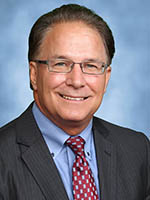
Tom Watkins
President and CEO, Detroit Wayne Mental Health Authority
[lightbox id="tom-bio" width="800px" padding="30px"]
Tom Watkins
Tom Watkins currently serves as the President and CEO of the Detroit Wayne Mental Health Authority (DWMHA). Working with a dedicated community board of directors, leadership team, staff and host of provider networks to manage and lead a comprehensive system of care that offers treatment and support to over 72,000 people with mental illness, develop- mental disabilities and substance use disorders. He has quickly instilled the new mission of being consumer and community focused, evidence-based and data driven. Under his leadership, DWMHA has al- ready begun to examine current practices and reduce administrative costs in order to deliver as much funding as possible for quality programs and services as the organization continues to “put people first”.
His career and commitment to serving people spans over three decades. Tom served as Deputy Director of Administration, Chief Deputy and Director of the State Department of Mental Health under Governor Jim Blanchard. Here he improved community-based service delivery to over 300,000 consumers and was responsible for re-accrediting hospitals serving persons with mental illnesses and developmental disabilities.
Mr. Watkins’ also worked for years as the Deputy and Director of the State of Michigan Department of Mental Health. It was in this role where he re-accredited all hospitals serving patients with mental illnesses or developmental disabilities and improved community- based service delivery to over 300,000 patients in a cost-effective manner.
Tom served the citizens of Michigan as State Superintendent of Schools; there he used a yard stick in his office as a guide to other staffers. The yard stick was a reminder that their service, care and advice – must all “measure up” to the quality that would be acceptable to what would be offered to their own children and family members. Tom has always held the mantra of “putting people first”. His commitment to improving the quality of life of others has taken him from schools, to group homes to mental hospitals. He is passionate about his work and passionate about helping people.
[/lightbox]
MASTER OF CEREMONIES
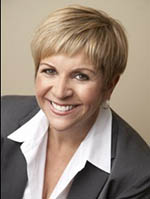
Cynthia Canty
Producer and Host of Michigan Radio's Stateside
[lightbox id="cynthia-bio" width="800px" padding="30px"]
Cynthia Canty
When Cynthia Canty embarked on her professional journey, she never thought broadcasting would become her life. In fact, her first job out of the University of Detroit Mercy was as a Health Educator and Public Speaker for the American Cancer Society. As the speaking and media engagements mounted, so did the buzz about Cynthia Canty in the Detroit broadcast market. “Producers kept telling me I should get into the business because I was so relaxed in front of the camera or microphone. It didn’t take me long to decide to go for it!” Reporting and broadcast news writing classes quickly led to her first job in the industry, working as a news anchor overnights at WMUZ-103.5FM. In just 9 months, Canty was invited to become the news anchor with one of the highest- rated morning shows in Detroit. She joined the legendary Jim Harper and Jerry St. James on WNIC-100.3. It was during those years that Cynthia Canty became the first woman in the country to broadcast from her home while on maternity leave. Throughout the 80’s Canty continued to build a successful career as a news anchor and morning show personality.
By the latter part of the decade, Canty realized it was time to challenge herself and take a crack at television news. She began by hosting Morning Break and Newsline, public affairs shows on WKBD-TV. She also produced Ask The Governor, working closely with Michigan Governor James Blanchard on a quarterly program that gave viewers and audience members a chance to question the Governor. Once again, her inviting smile, engaging voice, curiosity and compassion- ate nature led her to the job she’d been aiming for: reporting and anchoring on WKBD’s Ten O’Clock “The magic of broad- casting, whether in TV or radio, is in discovering stories, News. “Canty declared. Whether it was discovering the life’s stories of the homeless people on Detroit’s streets, covering the issues and problems facing Detroit, interviewing nota- bles in politics, business, health, science and entertainment, or lighter fare such as discovering an ostrich farm in central Michigan, Cynthia Canty was equally at home.
Over the next decade, Canty filed countless stories as a medical reporter, general assignment reporter, consumer reporter and anchor. Her reporting and writing earned her many awards, including an Emmy and honors from the Michigan Association of Broadcasters, the Associated Press and the Detroit Press Club called Canty with an invitation to come back and re-join him on his morning radio show, The Breakfast Club. “It was a no-brainer, “Canty recalled. “It was a chance to be home at night and on weekends with my family. And it was a chance to focus on the upbeat side of life. I got to practice my laugh again!” Radio approached Canty with the idea of creating a talk show for public radio listeners in Michigan. As a long time listener to public radio, Canty is relishing the opportunity to have in-depth conversa- tions with newsmakers, artists, thinkers, and the interesting people that make Michigan what it is.e.
[/lightbox]
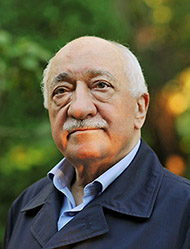
Fethullah Gulen
Turkish Muslim scholar, thinker, and poet
M. Fethullah Gulen was born in the small village of Korucuk, in Erzurum Province, Eastern Turkey, in November 1938. Known by his simple and austere life style, Mr. Gulen has been from his earliest years a gifted Islamic scholar and thinker, and a creative writer and poet. His father taught him Arabic, and initiated in him his profound love of Prophet Mohammad (PBUH) and his Companions. Later he continued his studies under the guidance of some of the most prominent Islamic scholars in Eastern Turkey. He received further training in the religious sciences.
Mr. Gulen, so distinguished himself that he was asked to begin teaching when he was only fifteen. He did so while continuing his studies in the religious sciences. Blessed with extraordinary oratory skills, even at young age, Gulen was recognized as one of the more accomplished Islamic preachers in the early 1950s, mentioned in the same breath with some of the more learned scholars, many years his senior, in Eastern Anatolia. Gulen devoted his life trying to solve society’s ills and spiritual sufferings, and inspired the establishment of many charitable organizations to serve the welfare of the underprivileged. He published a number of well-known books, most of which remain on the best seller list in Turkey, and have also been translated into English. These include The Infinite Light, Questions, Towards the Lost Paradise, and Truth through Colors. At a time when humanity is in a desperate need of leaders and role models, we find a true innovator and an inspirational leader as well as a deeply good man in M. Fethullah Gulen.
When he retired from formal teaching studies in 1980 he had inspired a whole generation of young students, many of whom are leaders in their communities today and of course, Niagara Foundation itself, especially they are the purpose of this evening, all based upon the work of this man
David Crumm
Thank you so much for including me in this program tonight. Niagara Foundation’s goals are one with the goals shared by “Read the Spirit” online magazine and publishing houses that we have been establishing and our expanding to number of universities across the US and other cities across the US. What motivates me when I wake up in the morning is the ability to use the tools that we have in the kinds of publishing we do, new technology kind of publishing that we produce to allow more people to have their voices and stories heard in more places.
World peace is only possible when all of our stories have the capacity to reach others. We connect through the stories of the lives. I am a huge fan of your radio show and I urge any of you who are not regular listeners to her show to be listening to when hers comes on. I regularly time my errands everyday so that I can hear her show. And the reason that I do is because we share this value of lifting up the stories for people who need to be more likely heard. I thank the Niagara Foundation for your effort to do the same, we are partners in the same dream. Thank you for inviting me tonight and thank you for honoring the “Read the Spirit”.
Martin Ackley
Mike Flanagan again regrets not being able to here tonight. He certainly appreciates this honor, and appreciates the work of the Niagara Foundation. Mike has for this entire career fought for and pushed for quality education for all kids regardless of race and culture, faith, economic conditions or even where they live. He believes that through education we can built greater knowledge, greater understanding, compassionate and sensible dialog leading to greater peace. So on behalf of Mike Flanagan, he thanks you for this honor and wishes you much success in fostering peace and understanding. Thank you.
Tom Watkins
Thank you very much for this truly meaningful recognition. Recognition for the great work not that I do but we do. Remember that old saying, “Can’t we all just get along?” And we find ways to build on our differences and strengths we all bring to this world. The world will be a better place. I accept this reward not for myself, but really the young people that are here with us tonight, special woman in my life to give you Sarah . You and the other young people in this room tonight are truly the hope to break down some of the prejudices, the discrimination, that can open the hearts and their minds to all people of the world. Because when we do that the world truly is a better place. Thank you so much.
Douglas Kindschi
Thank you so much. I accept this award on behalf of the Kaufman Interfaith Institute and the literal hundreds of people in our community in Grand Rapids who participated in the 2012 year of Interfaith Understanding. We had over 300 events, and this was all done out of an office of one person and a part-time assistant. But, it was the community that did it. It was the symphony, it was the art museum, it was the churches, and the synagogues, and the mosques. And, it was a community effort that we were so pleased. We have just launched our 2015 year of Interfaith Service focusing on community service and particularly working with along with college students and high school students to use their desire to serve on interfaith basis. But I also want to say a word about the Niagara Foundation, because I was privileged, as the picture shows, to travel with a group from Niagara to Turkey.
I was so impressed with the commitment to education, the commitment to service, the commitment to economic equality that the Niagara Foundation and its associated organizations have stood for. I am so impressed. I think the award for peace and dialog should go to the Niagara Foundation. But as a substitute, I am gonna keep this and thank you.
Jerry Smith
Thank you very much. Campus of soup kitchen is called the “Capuchin Soup Kitchen”, because it is sponsored by the province of Saint Joseph of the Capuchin order. We are a group of men who gave vows of poverty, chastity and obedience. We are part of the Roman Catholic Church, and we sponsor the Capuchin Soup Kitchen. It was kind of developed by accident. As Cindy told us, during 1929, men began lining up on the side walk outside the Saint Monastery asking for food to feed their families.
And so we have been feeding hungry people ever since. And currently, as I think we have said, we provide between 1600 – 2000 meals a day. So, that is a lot of food to a lot hungry people. But we realize that people are hungry in many different ways. And so we try to stimulate minds and encourage people’s spiritual life and so on so forth. And after nine years of soup kitchen, it occurs to me that there is two things that are very important I think that we do. One is that we try to help people realize that life can be different.
We try to open people’s imaginations and help they realize that they can do whole lot of things they probably never knew that they can do. For example, we have a training program for urban farming. People right from the soup kitchen who come into this eight month program, and learn about urban farming. Some of the graduates of that program have now started businesses selling earth worms. Another man is selling campos , another is selling transplants. These are all things that people probably never dreamed of, never thought of, and they realize that they can do that. Another thing is the Bakery that you saw which is staffed by men who are coming out of prison.
This is an attempt to help them restart their lives, develop job skills, save some money, learn to trade. And a couple of those graduates of that program, one of them now had spent more time in prison than he had as a free man in his adult life and he is now off parole for the first time in his life. He has his own apartment, he reconciled with his family. He has his own car. Things he never dreamed possible in the past. So this is one of the things we really do that is very important. It is help people know and dream that life can be different. The second thing I think that is really important that fits right in with this whole evening here is that we have approximately 3000 volunteers that participate in our program. Come down and work side by side with the men in the bakery, come down and sit down have meal with the people in our soup kitchen. We bring together people from totally different walks of life and you know what, in the process we discover our common humanity. And life is changed for both the people who come in from the suburbs often and the people from the city. We discover we are all same. We are all part of the human race. And that is something we really celebrate at the soup kitchen. And I think that is right on par with what the Niagara Foundation is doing. We thank you for this recognition which I humbly accept in the name of the guests, volunteers and staff that priors the Capuchin Soup Kitchen. Thank you very much.

